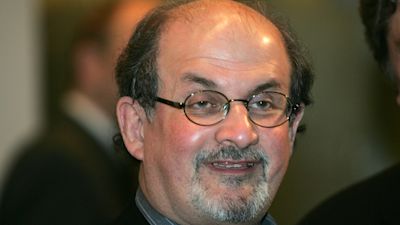Who is Salman Rushdie and why was there backlash to his novel 'The Satanic Verses'?

Sir Salman Rushdie was stabbed in the neck on a New York stage as he prepared to give a lecture on Friday and is on a ventilator in hospital.
A man stormed the stage and began punching or stabbing him 10 to 15 times as he was being introduced, according to an Associated Press reporter.
According to his agent, Andrew Wylie, he may lose an eye and sustained nerve damage to his arm and damage to his liver.
The author's writing has led to death threats from Iran in the past, but who is he, why is he famous, and why was there such a backlash to his novel?
Who is Sir Salman Rushdie?
Brought up a nominal Muslim, he never received an Islamic education, going instead to Rugby when he was 13.
Like his father, he went to King’s College, Cambridge, where he read history and appeared as “a tiny bulb in The Footlights” along with Clive James and Germaine Greer.
The young graduate dabbled in fringe theatre before moving into advertising. He dreamed up the “naughty but nice” slogan for fresh cream and the bubble “delectabubble” pun for Aero chocolate.
He began his writing career in the early 1970s with two unsuccessful books before Midnight’s Children, about the birth of India, which won the Booker Prize in 1981 and brought him worldwide fame.
Shame, based around the intricacies of Pakistani politics, followed two years later, confirming his reputation as the founder of a new genre, Anglo-Indian “magic realism”, with his own school of stylistic imitators.
But it was his fourth novel, The Satanic Verses, published in 1988, which resulted in criticism and controversy, and led to his life coming under threat.
Why was the novel so controversial?
The Satanic Verses is a parable of contemporary Britain and India and the conflict of good and evil, represented by two survivors from a jumbo jet blown up at 30,000ft who find themselves changing, one into the Angel Gabriel and the other into the Devil.
It was considered "blasphemous" by some members of the Muslim community as it parodied the Quran's account of the prophecies of Mohammed, the founder of Islam.
Iran's former ruler Ayatollah Khomeini sentenced Sir Salman to death in February 1989 in response to the novel, leaving the author trapped within a net of his written words and with a £1 million-plus bounty on his head.
Under Islamic law, he was found guilty of creating “fasad”, or public disorder in a land under divine sovereignty.
The ayatollah’s justification for his death sentence, or fatwa, was the riots and a dozen deaths in India and Pakistan that followed newspaper condemnation of the book, published in 1988.
The Satanic Verses was banned in 45 Islamic countries.
What happened next?
On February 14 1989, the BBC telephoned his Islington home with a message that Ayatollah Khomeini had sentenced him, and all those knowingly involved in the publication, to death.
He locked and shuttered his house, went to writer Bruce Chatwin’s memorial service, then vanished from the world with his second wife, American writer Marianne Wiggins.
After five months together in exile, Ms Wiggins walked out, unable to stand the strict security.
Penguin received repeated threats to staff and spent £2 million a year on security for its premises after shops were burned in Chelsea and York.
In March 1989, two men hunting Rushdie and travelling on forged Moroccan passports were stopped at Santander in Spain en route to Plymouth.
Five months later, a man blew himself up in a Paddington hotel room while making a bomb with military plastic explosive. A note to a French newspaper the next day said he died “preparing an attack on the apostate SR”.
On Christmas Eve in 1990, the author announced that he regretted writing The Satanic Verses, promised to stop publication of the paperback, and said he had embraced Islam – statements he later said he wished he had never made.
Appeasement failed. Iran responded by renewing the death sentence and doubling the reward for his murder.
In September 1998 that threat appeared to lessen significantly when Iran distanced itself decisively from the fatwa and the accompanying bounty.
Does he regret writing it?
He stressed he had no regrets about the book, adding: “There’s not a chance in hell of the book being withdrawn. We have not fought this battle for freedom of speech to give in at the last moment.”
Hailing his newfound freedom, he took the opportunity to express his gratitude to his wife, Elizabeth, whom he described as a “heroine.”
He told how Elizabeth, whom he had recently married, had shared with him eight and a quarter years of the nine and a half years of the ordeal.
He said: “Without her, I would not have survived this.”